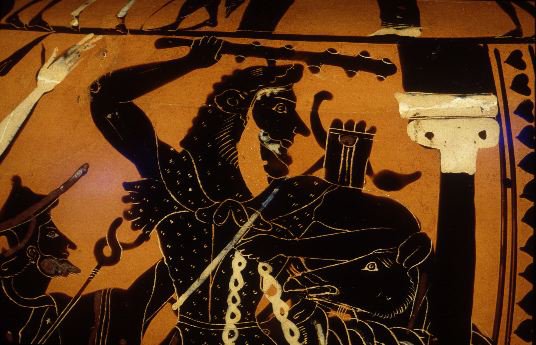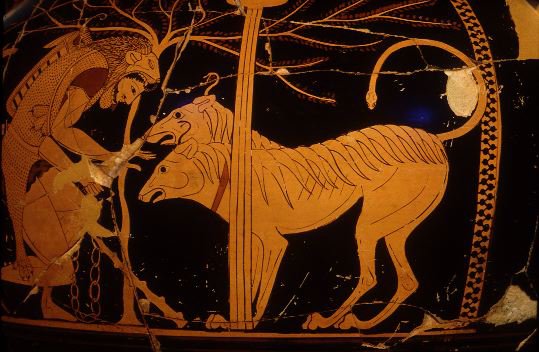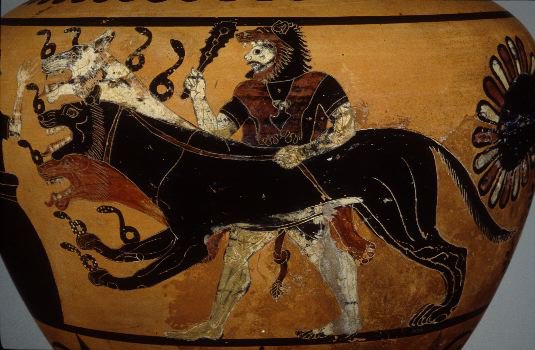Cerberus
The most dangerous labor of all was the twelfth and final one. Eurystheus ordered Hercules to go to the Underworld and kidnap the beast called Cerberus (or Kerberos). Eurystheus must have been sure Hercules would never succeed at this impossible task!
The ancient Greeks believed that after a person died, his or her spirit went to the world below and dwelled for eternity in the depths of the earth. The Underworld was the kingdom of Hades, also called Pluto, and his wife, Persephone. Depending on how a person lived his or her life, they might or might not experience never-ending punishment in Hades. All souls, whether good or bad, were destined for the kingdom of Hades.

Toledo 1969.371
Main panel:Hercules and Cerberus, upper half
Photograph by Maria Daniels, courtesy of the Toledo Museum of Art
Cerberus was a vicious beast that guarded the entrance to Hades and kept the living from entering the world of the dead. According to Apollodorus, Cerberus was a strange mixture of creatures: he had three heads of wild dogs, a dragon or serpent for a tail, and heads of snakes all over his back. Hesiod, though, says that Cerberus had fifty heads and devoured raw flesh.
|
. . . A monster not to be overcome and that may not be described, Cerberus who eats raw flesh, the brazen-voiced hound of Hades, fifty-headed, relentless and strong. Hesiod, Theogony 310 |
Cerberus' parents were the monster Echinda (half-woman, half-serpent) and Typhon (a fire-breathing giant covered with dragons and serpents). Even the gods of Olympus were afraid of Typhon.
Among the children attributed to this awful couple were Orthus (or Othros), the Hydra of Lerna, and the Chimaera. Orthus was a two-headed hound which guarded the cattle of Geryon. With the Chimaera, Orthus fathered the Nemean Lion and the Sphinx. The Chimaera was a three-headed fire-breathing monster, part lion, part snake, and part goat. Hercules seemed to have a lot of experience dealing with this family: he killed Orthus, when he stole the cattle of Geryon, and strangled the Nemean Lion. Compared to these unfortunate family members, Cerberus was actually rather lucky.

Louvre F 204
Side A: Kerberos
Photograph by Maria Daniels, courtesy of the Musée du Louvre
Before making the trip to the Underworld, Hercules decided that he should take some extra precautions. This was, after all, a journey from which no mortal had ever returned. Hercules knew that once in the kingdom of Hades, he might not be allowed to leave and rejoin the living. The hero went to Eleusis and saw Eumolpus, a priest who began what were known as the Eleusinian Mysteries. The mysteries were sacred religious rites which celebrated the myth of Demeter and her daughter Persephone. The ancients believed that those who learned the secrets of the mysteries would have happiness in the Underworld. After the hero met a few conditions of membership, Eumolpus initiated Hercules into the mysteries.
Hercules went to a place called Taenarum in Laconia. Through a deep, rocky cave, Hercules made his way down to the Underworld. He encountered monsters, heroes, and ghosts as he made his way through Hades. He even engaged in a wrestling contest! Then, finally, he found Pluto and asked the god for Cerberus. The lord of the Underworld replied that Hercules could indeed take Cerberus with him, but only if he overpowered the beast with nothing more than his own brute strength.
A weaponless Hercules set off to find Cerberus. Near the gates of Acheron, one of the five rivers of the Underworld, Hercules encountered Cerberus. Undaunted, the hero threw his strong arms around the beast, perhaps grasping all three heads at once, and wrestled Cerberus into submission. The dragon in the tail of the fierce flesh-eating guard dog bit Hercules, but that did not stop him. Cerberus had to submit to the force of the hero, and Hercules brought Cerberus to Eurystheus. Unlike other monsters that crossed the path of the legendary hero, Cerberus was returned safely to Hades, where he resumed guarding the gateway to the Underworld. Presumably, Hercules inflicted no lasting damage on Cerberus, except, of course, the wound to his pride!

Louvre E 701
Main panel: Hercules and Kerberos
Photograph by Maria Daniels, courtesy of the Musée du Louvre
(lmc)
To read more about these topics, see Further Resources.
- Labor 1: The Nemean Lion
- Labor 2: The Lernean Hydra
- Labor 3: The Hind of Ceryneia
- Labor 4: The Erymanthean Boar
- Labor 5: The Augean Stables
- Labor 6: The Stymphalian Birds
- Labor 7: The Cretan Bull
- Labor 8: The Horses of Diomedes
- Labor 9: The Belt of Hippolyte
- Labor 10: Geryon's Cattle
- Labor 11: The Apples of the Hesperides
- Labor 12: Cerberus
This exhibit is a subset of materials from the Perseus Project digital library and is copyrighted. Please send us your comments.